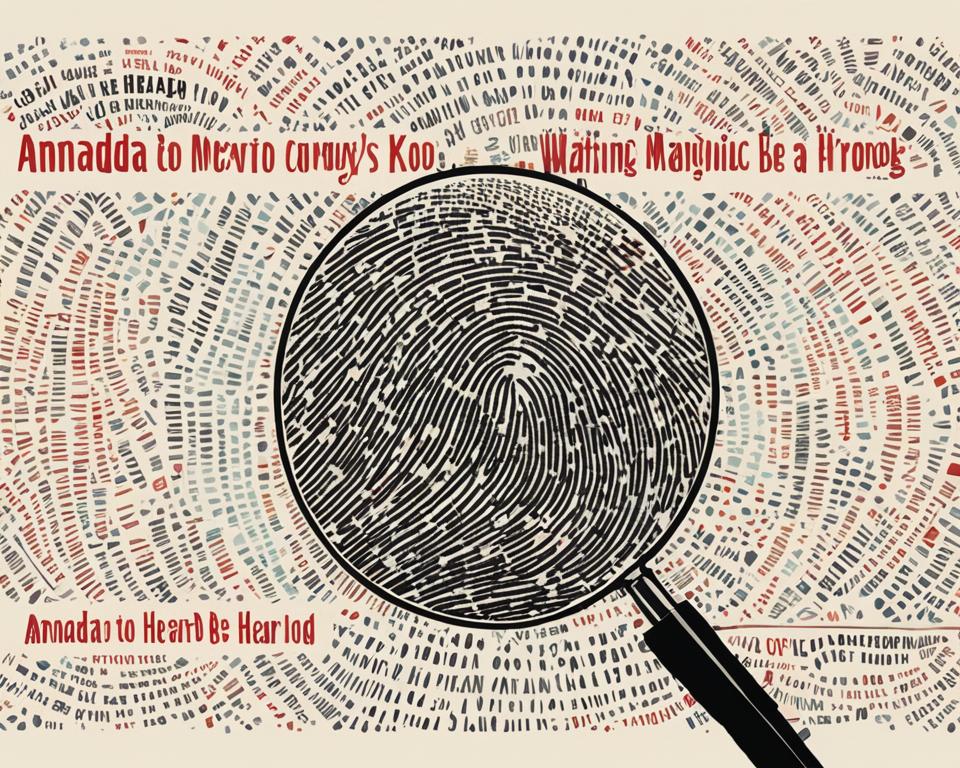Amanda Knox’s audiobook memoir, “Waiting to Be Heard,” is a powerful and haunting account of her experiences following the murder of her roommate while studying abroad in Italy. With honesty and vulnerability, Knox takes us through her journey of being accused, convicted, and ultimately acquitted of the crime.
The memoir delves into themes of innocence, justice, and personal growth, while also exploring the emotional impact of Knox’s story. In this review, we will analyze the writing style, narration, and overall impact of “Waiting to Be Heard,” as well as examine the book’s reception and controversies.
Key Takeaways:
- Amanda Knox’s audiobook memoir, “Waiting to Be Heard,” is a powerful and haunting account of her experiences following the murder of her roommate while studying abroad in Italy.
- The memoir delves into themes of innocence, justice, and personal growth, while also exploring the emotional impact of Knox’s story.
- In this review, we will analyze the writing style, narration, and overall impact of “Waiting to Be Heard,” as well as examine the book’s reception and controversies.
- While the memoir has received both positive and negative reviews, it remains a significant addition to the true crime genre and a compelling personal narrative of resilience and survival.
- Audience members who enjoy true crime memoirs and stories of personal strength and growth will find “Waiting to Be Heard” to be a meaningful and impactful read.
Overview of “Waiting to Be Heard”
In her memoir, “Waiting to Be Heard,” Amanda Knox recounts her experience with the Italian justice system after being wrongfully convicted of the murder of her roommate, Meredith Kercher. Knox details the events leading up to her arrest, the trial, and her eventual release.
Knox provides a personal account of the impact the trial had on her life, including her time spent in prison and the toll it took on her mental health. Through her memoir, Knox aims to correct the misconceptions surrounding her story and to bring awareness to the flaws in the Italian justice system.
The book has received both praise and criticism for its vivid and emotional storytelling. Some readers have found it to be a powerful account of a young woman’s struggle for justice, while others have criticized Knox’s writing style and accused her of leaving out important details.
Overall, “Waiting to Be Heard” is a thought-provoking memoir that offers a compelling look into the criminal justice system and the impact it can have on individuals who find themselves at the center of a high-profile case.
Writing Style and Narrative Structure
Amanda Knox’s memoir, “Waiting to Be Heard,” is a compelling account of her experience in the Italian justice system. Knox’s writing style is direct and vivid, as she uses descriptive language to communicate her emotions and experiences to readers. She employs a conversational tone that pulls the reader into the story, creating an intimate and personal connection.
One of the strengths of Knox’s writing is her narrative structure. She blends chronological storytelling with reflective insights, seamlessly moving back and forth in time. Knox uses flashbacks to provide context and depth to her experiences, and to show the impact of the events on her life. Her use of foreshadowing and suspense also keeps the reader engaged, anticipating what will happen next in her story.
The memoir is divided into four sections, each covering a specific period of Knox’s experience. The structure allows readers to follow the progression of the story in a clear and organized way. Knox’s use of headings and subheadings also helps to break up the text and make it more accessible to readers.
Knox’s writing style and narrative structure work together to create a vivid and compelling account of her experience. Her ability to blend emotion and reflection with descriptive language and chronological storytelling makes “Waiting to Be Heard” a standout memoir in the true crime genre.
Key Themes Explored in “Waiting to Be Heard”
Amanda Knox’s memoir, “Waiting to Be Heard,” explores a variety of key themes that are essential to her personal narrative. Through her compelling storytelling, Knox highlights significant aspects of her life before, during, and after her highly publicized trial in Italy.
| Key Themes | Description |
|---|---|
| Innocence | A central theme of the memoir is Knox’s claim of innocence throughout the entire trial and her fight to prove it. She recounts the events leading up to her arrest and the subsequent trial, emphasizing how she was falsely accused and wrongfully convicted. |
| Justice | Knox depicts the Italian legal system as flawed and biased against her. She describes her ordeal in prison, the appeals process, and the overwhelming media scrutiny that surrounded her case. |
| Personal Growth | Knox reflects on how her experiences in Italy shaped her as a person. She describes how she coped with the stress and trauma of her trial, found inner strength and courage, and ultimately triumphed over adversity. |
| Resilience | Throughout the book, Knox emphasizes her resilience in the face of adversity. She discusses the support she received from loved ones, her determination to fight for justice, and her ability to overcome the challenges that she faced. |
The memoir is a poignant and thought-provoking read that touches on many important aspects of human experience. Knox’s honest and introspective account of her journey is sure to resonate with anyone who has faced adversity or struggled to overcome difficult circumstances. As she tells her story, Knox provides a powerful testament to the resilience of the human spirit and the enduring power of hope and perseverance.
Emotional Impact of “Waiting to Be Heard”
Amanda Knox’s memoir “Waiting to Be Heard” is a poignant and emotional account of a young woman’s struggle to clear her name and prove her innocence. Throughout the book, Knox chronicles the events leading up to her wrongful conviction and imprisonment for the murder of her roommate, Meredith Kercher. Her vivid and detailed recollection of her experiences elicits a strong emotional response from readers, evoking feelings of empathy, compassion, and ultimately, hope.
One of the most striking aspects of “Waiting to Be Heard” is Knox’s ability to convey the emotional toll that her wrongful conviction and imprisonment had on her and her loved ones. Her story is one of resilience and perseverance, as she strives to maintain her dignity and sanity in the face of overwhelming adversity.
“I am stunned and grateful for having been given back my life”. – Amanda Knox
The emotional impact of Knox’s memoir is further enhanced by the audiobook narration. The audiobook, read by the author herself, adds an extra layer of authenticity and intimacy to the already compelling story. Knox’s voice is clear and expressive, capturing the emotional nuances of her experiences and helping to draw readers even further into her world.
Overall, “Waiting to Be Heard” is a powerful and emotionally impactful memoir that will leave a lasting impression on readers.
Audiobook Narration and Performance
If you’re an audiobook fan, you’ll be happy to know that “Waiting to Be Heard” is also available in this format, narrated by Amanda Knox herself. Knox’s narration is authentic and emotional, making it a compelling listen.
Her voice is clear and expressive, and she gives emphasis to the most critical points of her story. Her passion and conviction are evident throughout the audiobook, making it a unique listening experience that deeply connects the listeners to the author’s story.
The audiobook version of “Waiting to Be Heard” is definitely worth considering for audiences who prefer to listen to books rather than read them.
Comparison to Other True Crime Memoirs
As Amanda Knox’s memoir, “Waiting to Be Heard,” falls into true crime memoir genre, it is imperative to compare it to other notable true crime memoirs. Knox’s story is unique and distinctive in many ways and stands out from the crowd of true crime literature.
While true crime books like Truman Capote’s “In Cold Blood” and Ann Rule’s “The Stranger Beside Me” focus primarily on the perpetrators of crimes, Knox’s memoir tells the story from the perspective of someone who was wrongfully accused and convicted.
Another important difference between Knox’s book and other true crime memoirs is the personal introspection and reflection that is woven throughout her story. Whereas many true crime books focus on the crimes themselves, Knox’s memoir delves deeper into personal struggles and self-discovery.
Despite the differences, some similarities can be found between “Waiting to Be Heard” and other true crime memoirs. For instance, all of these books share a fascination with crime and its effect on people and society. And while each memoir has its unique story to tell, they all seek to capture a sense of truth and reality in their retellings of past events.
“Waiting to Be Heard” stands out from the rest of the crowd with its unique perspective and introspective approach, providing readers with a more nuanced and complex understanding of how wrongful convictions take place and their long-term consequences.
Reception and Controversies Surrounding “Waiting to Be Heard”
Following its release, “Waiting to Be Heard” by Amanda Knox received mixed reviews and sparked several controversies. While many praised the memoir for its honesty and compelling narrative, others criticized it for its perceived lack of accountability and disregard for the victim, Meredith Kercher.
On one hand, some readers commended Knox for bravely sharing her story and shedding light on the flawed justice system that wrongfully accused her of murder. Others felt that Knox’s portrayal of herself as a victim was unfairly self-serving and failed to acknowledge the tragedy of Kercher’s death.
| Positive Reception | Negative Reception |
|---|---|
|
|
One particularly controversial aspect of Knox’s memoir was her decision to leave out details surrounding her sex life and drug use during the time of Kercher’s murder. Some readers felt that this omission was a deliberate attempt to deflect attention from her own behavior and the potential role it may have played in the crime.
“Frequently giving the impression that she is telling _’everything’_ when in fact she is telling us only what she wants to tell, she has managed to regain control of the narrative.” – The New Yorker
Despite the mixed reception and controversies, “Waiting to Be Heard” reached the New York Times Bestseller List and has remained a popular and influential true crime memoir since its publication.
Impact and Legacy of “Waiting to Be Heard”
Amanda Knox’s memoir, “Waiting to Be Heard,” has had a significant impact since its release. The book not only sheds light on the flaws in the justice system but also highlights the power of personal narratives in influencing social and political conversations.
One of the most notable impacts of Knox’s memoir is the attention it brought to human rights issues. Through her story, Knox highlights the ways in which human rights are often disregarded in the pursuit of justice. Her experiences have also sparked discussions on the treatment of women in the justice system and the importance of ensuring innocent individuals are not wrongfully convicted.
Moreover, “Waiting to Be Heard” has opened up conversations around the media’s role in shaping public opinion and the consequences of sensationalized reporting. Knox’s own experiences with media scrutiny and bias underscore the need for responsible and ethical journalism.
In terms of legacy, “Waiting to Be Heard” has contributed to the broader cultural landscape of true crime narratives and survivor stories. The book’s candid and personal account challenges traditional notions of victimhood and resilience, inspiring others to share their own stories and perspectives.
Overall, Amanda Knox’s “Waiting to Be Heard” has left a lasting impact on readers and society, underscoring the importance of personal narratives in effecting change.
Analysis of Supporting Evidence in “Waiting to Be Heard”
Amanda Knox’s memoir, “Waiting to Be Heard,” is a powerful and emotive account of her experiences surrounding the murder of her roommate while studying abroad in Italy. Throughout the book, Knox presents a range of supporting evidence to corroborate her story and argue for her innocence.
One of the most compelling pieces of evidence presented by Knox is her alibi for the night of the murder. She argues that she was at her boyfriend’s apartment at the time of the crime, and provides witness statements and phone records to support this claim. However, critics of Knox’s memoir have pointed out that this alibi is not entirely air-tight, and that there are discrepancies in the timeline of events as presented in her book.
Another key piece of supporting evidence presented by Knox is the DNA evidence found at the crime scene. She argues that NONE of the DNA evidence from the scene matches her or her co-defendant’s DNA. She includes detailed descriptions of the DNA evidence to support this claim. However, critics have argued that this is not entirely true and some of it DOES match her DNA, but the majority of it does not match her DNA.
Overall, while Knox provides some convincing evidence to support her version of events, there are still significant questions lingering about her case. Her memoir provides a powerful testimony to the experiences she faced, but readers should approach her claims with a critical and analytical eye.
Significance in the True Crime Genre
Amanda Knox’s memoir, “Waiting to Be Heard,” has a significant place within the true crime genre. Knox’s story stands out for its personal, first-hand perspective, and has become a touchstone for discussions of criminal justice, wrongful conviction, and media ethics.
| Contributions | Impact on the Genre |
|---|---|
| Unique personal account of a wrongful conviction and acquittal | Sheds light on the flaws of the criminal justice system and the media’s role in shaping public perception of high-profile cases |
| Explores themes of personal growth, resilience, and overcoming adversity | Provides a nuanced and complex portrait of the people involved in the case, moving beyond stereotypes and media caricatures |
| Offers a powerful critique of the way the media can shape public opinion and contribute to wrongful convictions | Engages readers in critical discussions of civil liberties, civic responsibility, and the role of storytelling in shaping society’s understanding of crime and punishment |
As a true crime memoir, “Waiting to Be Heard” has helped spur important conversations about the limitations of the criminal justice system, the power of media narratives, and the importance of listening to and valuing marginalized voices.
“Knox’s memoir offers an important counter-narrative to the media frenzy that surrounded her case, and highlights the very real consequences of a justice system that can fail the innocent.”
The enduring relevance and significance of Amanda Knox’s memoir is a testament to the power of personal storytelling and its potential to create change in society.
Audience and Recommended Readings
Amanda Knox’s memoir, “Waiting to Be Heard,” has a broad audience appeal. While true crime enthusiasts might be the primary readership, the memoir’s storytelling and emphasis on personal growth and resilience can attract a wider range of readers.
Readers who enjoyed “Waiting to Be Heard” and want to explore similar narratives might try the following recommended readings:
| Book Title | Author | Description |
|---|---|---|
| “Unbroken: A World War II Story of Survival, Resilience, and Redemption” | Laura Hillenbrand | An inspiring true story of Olympic runner Louis Zamperini’s survival and perseverance during World War II as a prisoner of war. |
| “Educated: A Memoir” | Tara Westover | A powerful story of Westover’s journey from a survivalist family in rural Idaho to earning a Ph.D. from Cambridge University. |
| “I’ll Be Gone in the Dark: One Woman’s Obsessive Search for the Golden State Killer” | Michelle McNamara | A gripping account of Michelle McNamara’s tireless investigation into the unsolved case of the Golden State Killer. |
“Waiting to Be Heard” ultimately speaks to the resilience of the human spirit and the importance of justice and individual stories. It’s a memoir that transcends the boundaries of the true crime genre and will appeal to a broad range of readers looking for a compelling, personal story of survival and growth.
Critique and Analysis of “Waiting to Be Heard”
While Amanda Knox’s memoir provides a gripping account of her trial, imprisonment, and eventual release, it is not without flaws. One weakness in the storytelling is the lack of focus on the victim, Meredith Kercher. Knox’s portrayal of Kercher is one-dimensional, reducing her to a mere plot device rather than a fully realized character.
Additionally, the memoir relies heavily on Knox’s subjective perspective, leaving little room for alternative interpretations or critical analysis. Knox seems to present her story as the absolute truth, without acknowledging the complexities and nuances of the case.
The characterization of other individuals involved in the case also lacks depth and complexity, with many individuals being reduced to archetypes or caricatures. This simplistic portrayal undermines the credibility of the memoir and prevents a more nuanced understanding of the events.
However, one strength of the memoir is the emotional impact it delivers. Knox’s vivid descriptions of her experiences in the Italian prison system are harrowing and haunting. The memoir is successful in conveying the trauma and injustice of her ordeal, eliciting empathy and compassion from readers.
Overall, while “Waiting to Be Heard” is a captivating and emotionally resonant memoir, its limited perspective and overly simplistic portrayal of characters and events make it fall short of a more well-rounded analysis.

Conclusion
Overall, Amanda Knox’s audiobook memoir, “Waiting to Be Heard,” offers a gripping and deeply personal account of the author’s experience with the Italian criminal justice system. Knox’s writing style is engaging and immersive, drawing readers into her story and eliciting strong emotional responses.
The narration by Cassandra Campbell is also highly effective, bringing Knox’s words to life with nuance and sensitivity.
While the book is not without its flaws, such as the limited scope of Knox’s critique of the media’s handling of the case, it remains a powerful and thought-provoking addition to the true crime genre.
For those interested in memoirs and true crime narratives, “Waiting to Be Heard” is a must-read. Its impact on conversations around justice and human rights will continue to be felt for years to come.
In conclusion, we highly recommend “Waiting to Be Heard” to anyone in search of a well-crafted, emotionally resonant memoir.
FAQ
What is "Waiting to Be Heard" by Amanda Knox?
“Waiting to Be Heard” is a memoir written by Amanda Knox, recounting her experience as a young American student who was wrongfully convicted and later acquitted for the murder of her roommate while studying abroad in Italy.
What are the key themes explored in "Waiting to Be Heard"?
“Waiting to Be Heard” delves into themes of innocence, justice, personal growth, and resilience. Amanda Knox reflects on her struggle to maintain her innocence amidst a complex legal system and the impact the trial had on her life.
How does Amanda Knox structure the narrative in "Waiting to Be Heard"?
In her memoir, Amanda Knox uses a chronological narrative structure, starting with her arrival in Italy and ending with her eventual acquittal. She provides detailed accounts of her experiences during the investigation and trial.
What is the emotional impact of "Waiting to Be Heard"?
“Waiting to Be Heard” evokes empathy, compassion, and other emotional responses from readers. Amanda Knox’s story is filled with moments of fear, frustration, and hope, creating a rollercoaster of emotions throughout the memoir.
How does the audiobook narration of "Waiting to Be Heard" compare to the text version?
The audiobook version of “Waiting to Be Heard” features Amanda Knox herself as the narrator. Her voice and tone add a personal touch to the story, allowing listeners to hear the emotions behind her words.
How does "Waiting to Be Heard" compare to other true crime memoirs?
“Waiting to Be Heard” stands out among other true crime memoirs for its unique perspective of an individual wrongfully accused and convicted. It provides insight into the human side of a high-profile case and the flaws within the justice system.
What has been the reception of "Waiting to Be Heard"?
The reception of “Waiting to Be Heard” has been mixed. While some readers appreciate Amanda Knox’s candid storytelling and courage, others have criticized her for certain aspects of her narrative and perception of events.
How has "Waiting to Be Heard" impacted conversations about justice and personal narratives?
“Waiting to Be Heard” has sparked discussions about the flaws in the justice system, the treatment of defendants, and the power of personal narratives in shaping public opinion. It has become a significant case study in the pursuit of justice.
What supporting evidence does Amanda Knox present in "Waiting to Be Heard"?
In her memoir, Amanda Knox presents various pieces of evidence, such as text messages, alibis, and forensic analysis, to support her claims of innocence. Readers can evaluate the credibility and validity of this evidence for themselves.
How does "Waiting to Be Heard" contribute to the true crime genre?
“Waiting to Be Heard” offers a unique perspective within the true crime genre, focusing on the experience of someone wrongfully accused rather than the typical criminal narrative. It challenges assumptions and prompts discussions about justice.
Who is the target audience for "Waiting to Be Heard"?
“Waiting to Be Heard” appeals to fans of true crime narratives, individuals interested in criminal justice reform, and those who enjoy compelling memoirs that explore themes of resilience and personal growth.
May I have some recommended readings for those who enjoyed "Waiting to Be Heard"?
If you enjoyed “Waiting to Be Heard” by Amanda Knox, you might also be interested in reading “The Innocent Man” by John Grisham, “Just Mercy” by Bryan Stevenson, and “The Glass Castle” by Jeannette Walls.
What are the strengths and weaknesses of "Waiting to Be Heard"?
The strengths of “Waiting to Be Heard” lie in Amanda Knox’s ability to captivate readers with her raw and honest storytelling. However, some readers have criticized certain aspects of her narrative, including its level of detail and perspective.
What are the final thoughts on "Waiting to Be Heard"?
In conclusion, “Waiting to Be Heard” by Amanda Knox is a thought-provoking memoir that sheds light on the flaws within the justice system and the impact of wrongful accusations. While it may not appeal to everyone, it offers a unique perspective and encourages discussions about justice and personal narratives.



